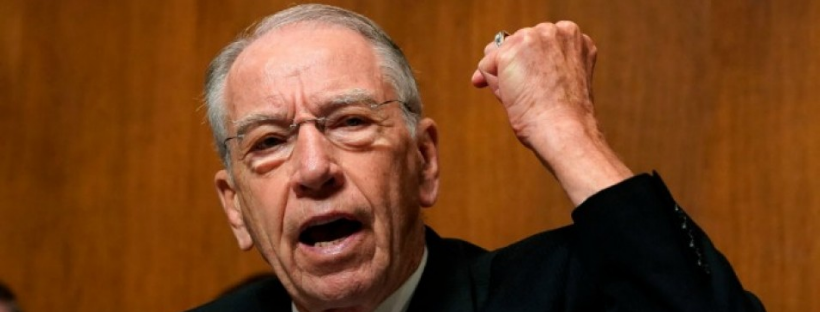This week, Senator Chuck Grassley (R-IA) sent a letter to the Secretary of Health and Human Services and FDA Commissioner declaring support for the Trump administration’s drug importation plan but warning about the need to up our game inspecting foreign drug manufacturing establishments. Grassley cautioned that the U.S. must ensure new imports are properly tracked and traced within the supply chain. While there are some details in Grassley’s recently stated position that are a bit blurry, the essence of what the senator is saying is very good. We can use global trade to force down prices on prescription drugs in the U.S. while continuing to work on and improve the safety of our already-existing global pharmaceutical supply.
Senator Grassley has vociferously supported drug importation for a long time. As reported in The Hill in 2012, he was intensely critical of President Obama for going back on his 2008 campaign promise to support dug importation:
“[Obama] shouldn’t have made a deal with the pharmaceutical companies on Obamacare two years ago…Imports create competition and keep domestic industry more responsive to consumers…Consumers in the United States pay far more for prescription drugs than those in other countries.”
In 2015, Sen. Grassley and the late great Senator John McCain (R-AZ) sent a letter to Obama’s HHS Secretary asking her to expressly permit individuals to directly import certain medications for personal use where there is no competition in the U.S. market.
Sen. Grassley is also the author of importation bills to make it expressly legal for Americans to import medications directly from pharmacies in Canada. Currently, the Safe and Affordable Drugs from Canada Act of 2019, S61, has 11 co-sponsors.
But Grassley’s championing of importation doesn’t end there! Troubled by reports of the FDA seizing prescription drug orders from American patients and enforcement actions against companies that help people purchase lower-cost, imported medicines, Sen. Grassley teamed up with Sen. Amy Klobuchar in 2017 to send a letter to former FDA Commissioner Gottlieb:
“We are concerned that the Food and Drug Administration (FDA) may be taking actions to scale back the agency’s ‘non-enforcement policy’ that currently allows for limited importation of prescription drugs.”
Grassley’s Focus on Drug Safety in Supporting Importation
This week, Grassley raised drug safety and quality issues related to President Trump’s importation plan. The timing of Grassley’s latest concern about the safety of imported drugs is surprising. You have an administration for the first time admitting to the American people that importation of lower-cost drugs can be done safely.
Grassley’s support for importation had all along been premised on this fact: Americans can get cheaper medicines in Canada without any greater risk than found in a U.S. pharmacy.
Now, perhaps because importation seems like it has real momentum, Grassley is raising concerns about our ability to effectively implement track and trace, but more so about inspections of foreign drug establishments, especially ones making active pharmaceutical ingredients used to make finished drug products for the U.S. market.
In terms of track-and-trace, authorized repackagers and re-labelers can add serialization to newly permitted imported products. Documenting the supply chain from foreign manufacturer to U.S. wholesaler in accordance with U.S. law – track and trace – is how we do importation now. Jane Horvath, a public policy expert on healthcare financing, states this perfectly in comments that appear in her recent op-ed in Stat News:
“As long as there is a verifiable paper trail of transactions and handling back to the manufacturing plant, serialization could occur at the time the product is relabeled for sale in the US. That trail back through supply chain to the manufacturing plant could be paper or electronic. It will be a condition of the contract between a state and its suppliers.”
Sen. Grassley’s concerns are greater when it comes to FDA inspections for drug manufacturing in foreign countries. But he’s calling for something very specific: surprise inspections. Until 2013, the FDA largely announced and planned inspections of foreign drug manufacturing plants. For a few years, under the Obama administration, the FDA was carrying out more surprise inspections in India, and it had led us to a better place in that we were uncovering problems and sending out more warning letters to discipline drug companies. For reasons that are not clear, the surprise inspections stopped in 2015. Grassley is saying he wants to re-start them. And that’s a good idea.
But taking steps to up our game on FDA foreign inspections should not slow us down on moving forward with Trump’s and other drug importation ideas. As Sen. Grassley stated, our medications in the U.S. are mostly made with foreign pharmaceutical ingredients – 80% – and most from India and China. Furthermore, 70% of popular brand name drugs are not made in the U.S. Doing a better job to ensure those ingredients are safe must not stop our momentum to help Americans obtain lower-cost, safe and effective drugs right now.
Our pharmaceutical supply is global, and we already rely on drug importation. The drug companies sell the same drugs cheaper in other countries and try to do whatever they can to prevent Americans from accessing those lower prices. It’s time to stop letting the drug companies control distribution of their products once they are sold to the first buyer, which works to the grave detriment of American patients.
I hope Sen. Grassley keeps carrying the torch on drug importation, while pushing forward on track and trace and surprise drug establishment inspections.
We can improve savings and safety at the same time.
Tagged with: Senator Chuck Grassley


